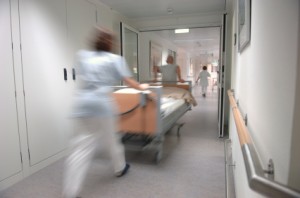Hospital Clocks—Placement Where it Matters
When putting synchronized hospital clocks into operation, healthcare facilities often find themselves consumed with the duty of choosing where those clocks should go. While this may seem like an easy task, administrators as well as facility managers, architects, and engineers all must carefully consider every room and area of a hospital without missing any important spots that would necessitate and reap the benefits of a synchronized hospital clock. In order to make this determination, it is vital to break down each type of room or area in a hospital by its functions.
One obvious type of space in a hospital is patient rooms. Whether obvious or not, these rooms benefit immensely from synchronized hospital clocks. For one, patients themselves need a reference for time during their recovery. It may otherwise be easy to lose track and difficult to determine when it is time for nurse visits, medications, and other processes such as physical therapy. As well as the direct benefit for patients to have an accurate hospital clock, hospital staff will find carrying out their tasks to be complicated without one. A reliable healthcare clock will make recording events (such as administering medication) simple, accurate and error free.
Another area to consider in hospital facilities is operating rooms. Anywhere where a surgery is conducted will truly find use for digital hospital clocks, in particular. Due to the sensitive nature of open wounds, procedures and anesthesia, surgical procedures must often be monitored for time and accurately recorded as well (especially for insurance purposes). Additionally, digital hospital clocks often have timing abilities that make it perfect for these kinds of operations where time duration is a serious factor in the well-being of the patient.
Even in waiting areas and hallways, doctors and patients alike make use of a hanging hospital clock. Consider the hectic schedules of hospital staff as they run back and forth between wings and buildings caring for patients, transporting test results and moving between breaks. These doctors, nurses, and other personnel are reminded they have places to be when they are able to glance at the time throughout their daily rounds. Even visitors find a time reference necessary when they are waiting on loved ones to come out of risky procedures or while staying over for support. When digital hospital clocks are used with alternating display, viewers can also get the date as well as the time from the clock when necessary.
As it comes time to decide where to put clocks in your healthcare facility, the important thing is to consider every part of the hospital and the function of each area to best determine what the right solution is. No matter what various rooms and spaces you may have in a hospital, there may be a good reason why a synchronized hospital clock is necessary. When accurate, uniform time is needed throughout the most integral parts of the building, hospital clocks will offer the convenience and dependability your organization is looking for in a timekeeping solution.

